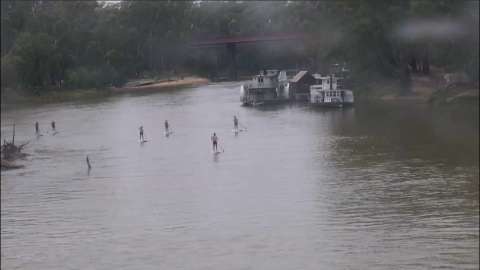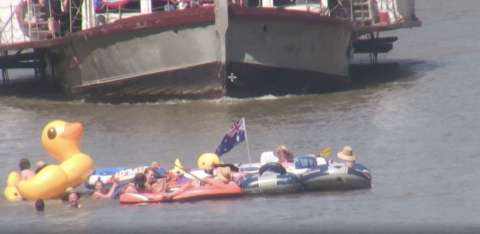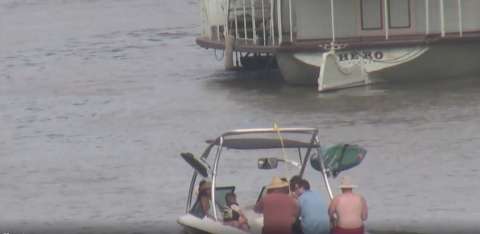
Hero(es) by Aaron Claringbold and Rebecca McCauley
With text by Neika Lehman
2019, single channel digital video with audio, 7 min 9 sec
Image courtesy the artists
© Aaron Claringbold & Rebecca McCauley
1. hoy!
what would churn interest?
to simply not re-enact?
to recede into something other
than an eco skirmish,
just like this…
what numbers please,
To have the confidence to
name this instead
with M:
mass-acres of fresh lively grass
laid flat
by trailers’ grilled feet
mud-busted vein
slog wood matters
ornate history society stuff
deadwood doors
done nothin
but chronicle trouble.
mechanics of:
how they got started
now erosion is an overused
word
how about we try harder
look to beauty in shit like
eutrophos
until that’s no matter too
understanding that
orders of well-nourished
charts
gone breathe
shouldn’t have taken that many fish
that
mud boats slide thick matter
from one historical spot to another
“paths past-travelled”
thick-arms
photos
cheers
& it did nothing
mud down the gullet
litres got a logo
who would want
to re-enact today
2.
this is a domestic space
this old river
there is intimacy here
long and loving laughter
warm entries
you would like to imagine this,
wouldn’t you?
frog shudders a plonk
across alluvial perfection
amphitheatre sounds
on a silent night
we come
refigure ears here
the river is not obscure
and will not become abstract
sad u won’t know until..
until?
it withdraws its care
it turns away
and we.. go
40 nations or basically a UN
in agreement: stop sign
in multiple languages
mother will not forget
river’s recent obscurity
and that one third production
from blind mouths
that fed.
Written by Neika Lehman
author’s note:
“Paths past-travelled” is a reference to Natalie Harkin’s 2014 essay ‘The Poetics of (Re)Mapping Archives: Memory in the Blood’.
Aaron Claringbold and Rebecca McCauley are emerging artists currently based in Naarm/Melbourne. Creating predominantly photo-based works the pair bring together shared interests to explore land, land-use, ecology and human presence within modern day ‘Australia’. In particular, they look to explore ways in which human impact and ideologies have shaped conceptions of nature through colonisation, feeding nationalistic identities around place. Reflecting on their shared positionality as settler-descendant white Australians, Rebecca and Aaron are inspired by work that confronts the entanglement of ecocide and genocide, and the social processes that engender them. They have a particular interest in practices that centre place-based bonding and responsibility, and that complicate the myriad of essentialisms underpinning the Australian Colonial Project.
The artists acknowledge the Traditional Owners of the area depicted as the Yorta Yorta people.
The artists acknowledge the shared land and proximity of the Baraba Baraba and the Ngurai illam Wurrung, and that the waters of the river this work is made on have nurtured and sustained tens of thousands of generations of people. Sovereignty was never ceded.
Aaron Claringbold & Rebecca McCauley
Hero(es), 2019
Single channel digital video with audio, 7 min 9 sec
Images courtesy of the artists
© Aaron Claringbold & Rebecca McCauley
Video taken though an unsecured cctv camera overlooking public space on the Murray River in Echuca Moama. Recorded over the long weekend of 26 January.
Underwater recordings of marine vessels supplied courtesy of the Centre for Marine Science and Technology, Curtin University.
The dual towns of Echuca Moama sit on the banks of the Murray and Campaspe River, across both Victoria and New South Wales.


